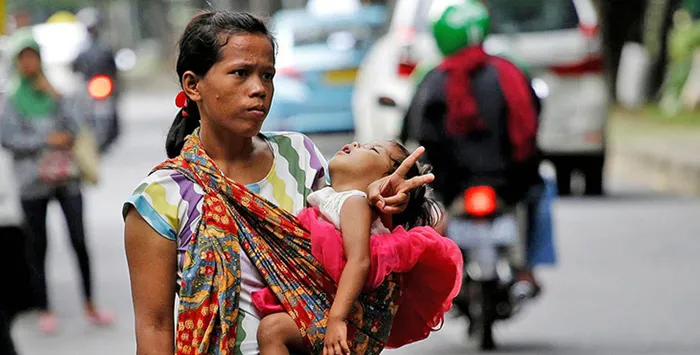
In this Friday, April 1, 2016, photo, a woman carries her baby as she signals to show that she's for hire as a "jockey" to help drivers cheat a peak time traffic rule of three people to one car during rush hour, at the main business district in Jakarta, Indonesia. Traffic clogged Jakarta planned to suspend the peak time traffic rule this week raising concerns among the jockeys that they could lose their way to eke out living. (AP Photo/Achmad Ibrahim) In this Friday, April 1, 2016, photo, a woman carries her baby as she signals to show that she's for hire as a "jockey" to help drivers cheat a peak time traffic rule of three people to one car during rush hour, at the main business district in Jakarta, Indonesia. Traffic clogged Jakarta planned to suspend the peak time traffic rule this week raising concerns among the jockeys that they could lose their way to eke out living. (AP Photo/Achmad Ibrahim)
Jakarta, Indonesia - The livelihoods of Jakarta's professional car-pool passengers are in doubt as the city suspends a rule requiring cars to carry three or more passengers during rush hour on main roads.
Jakarta governor Basuki Tjahaja Purnama decided to suspend the carpool rule for a week to see whether it could be scrapped for good.
The rule had failed to reduce traffic jams and been abused by drivers who pick up passengers on streets to cheat the scheme, he said.
Rohman Fauzi is one of such passengers who make up to 65 000 rupiah (about R70) a day from sitting in strangers' cars to allow them to circulate during the restricted times.
“If they finally decide to scrap the 3-in-1, I can only resign my fate to God,” he said. “I hope the government can give us jobs.”
Fauzi said his entire family, including his mother and wife, had been scraping a living for years as passengers for hire, known as jockeys, despite the practice being illegal.
Tech to tackle severe Jakarta Jams
The 3-in-1 scheme limits traffic from 7am to 10am and again from 4.30pm to 7pm on three of the city's main thoroughfares.
Governor Basuki said the rule had given rise to child exploitation, with mothers carrying babies and small children so they can be picked up by drivers who refuse to pay two people.
“We suspect that the 3-in-1 rule has not improved traffic because people use jockeys and babies have become victims,” Basuki said.
The city administration is planning to adopt an electronic toll collection scheme, known as Electronic Road Pricing, on the capital's busiest roads to replace the carpool system.
The system was tested in 2014 but it is not clear when it will be implemented, with Basuki saying that regulatory details were still being worked out.
Jakarta, a city of 10 million people known for severe congestion, does not have a mass rapid transit system and its bus lanes are often clogged with cars and motorcycles.
The city is building a metro system but it will not be operational until late 2018 and in the interim road restrictions caused by the construction work have further disrupted traffic
DPA
